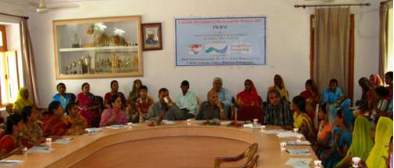Mr Anil Mehta, Secretary of JSS, said that the burden of water collection falls on women and girls and therefore it is urgent to give attention to strategies to empower them so as to play an effective, sustained and dynamic role at all levels of water resources management.
The participants noted that:
• The women present should increase their role and participation in the implementation of the State Water Policy and on-going projects in their area, underlining that one of the major causes of low interest is lack of education and awareness.
• Women’s convenience, in terms of time and distance, should be the first criterion when deciding the time and place for Water Users Association (WUA) meetings.
• The WUAs distribution of irrigation water functions arbitrarily and there is no voice of women in that meeting.
• Water supply schemes are usually placed near influential persons, forcing women to bring water on their heads from two to three kilometer distances.
• Women members are the most susceptible to water borne diseases due to their role in water collection, washing and other domestic activities.
• Women have to travel long distances to fetch water and carry it on their heads, which lead to diseases related to spine, neck, shoulders, etc.
• If any member of the family suffers from any water borne disease, then the responsibility to take care of the sick member falls on women.
• Women and girls feel unsafe when they have to go far from their houses to use a toilet. Women and girls suffer from problems like malnutrition, illiteracy and anemia.
Udaipur Times http://www.udaipurtimes.com/rural-women-attended-workshop-on-water-management/
